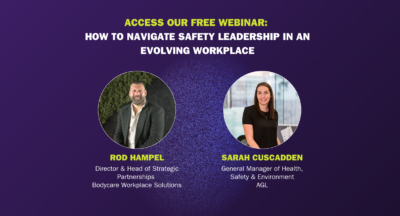When you or one of your employees has been absent from work due to an injury, it can be hard for both parties to manage the return to work process. Here’s what you should know about the return to work and what responsibilities you have as an employer or an employee to make sure the process is a positive experience for everyone involved.
Employer’s guide on return to work after an injury
What are your responsibilities as an employer?
As an employer, you’re responsible for ensuring that injured workers can return to work safely and without fear of being treated negatively. It’s against the law to discriminate against an injured worker, whether or not their injury happened at work. An injured worker is someone with a temporary or permanent physical, psychological or neurological disability.
It’s also your responsibility to make a plan for the injured worker to return to work. Depending on the nature of their injury and how far into their recovery they are, they might not be able to work full-time or perform all their normal duties. It’s most likely that they will need suitable duties when they first return to work or have their workload or hours adapted.
You might also have to make some changes in the workplace to accommodate them. This could include installing specific equipment or changing the layout of your premises to make things easier for them.
How soon should you contact an injured worker?
If one of your employees needs to be off work due to an injury, it’s important not to forget about them. They’re more likely to recover and return to work quickly if you get in contact with them as soon as possible to let them know that you are there to help.
Maintaining contact with your injured worker will make it easier and less stressful for them when it comes time to return to work. It’s important that you work closely with them to put a plan in place for their return and the plan must be agreed to by both parties.
When creating a return to work plan, it’s important to find out what you can do to make sure the workplace is safe, healthy and suitable for them when they return. Ask them what they need, and put the answers into action. This way you are more likely to achieve positive return to work outcomes.
Employee’s guide on returning to work after an injury
How soon should you return to work after an injury?
There is no definitive answer to this as it depends on the individual and the nature of the injury. However, research shows that getting back to work can be an important part of the recovery process. Returning to work can make you feel like you are getting back on track and returning to some sort of normality and routine. It also prevents the money worries which go with long periods of absence from work.
Because of these factors, it’s important for injured workers to return to work as soon as they feel comfortable. However, you shouldn’t be forced or pressured to return before you’re ready.
In addition, it’s important for your employer to remember that just because you are back at work, it doesn’t necessarily mean that you’re back to full fitness. This is why it’s important for them to approach your return to work in a sympathetic and collaborative way.
What can I do as an employee to return to work safely?
If you’re an employee returning to work after an injury, you have to take every precaution to prevent it from happening again. How you do this will depend on the nature of your injury.
If you have a physical injury, it’s essential to watch your posture and use the correct work methods, especially if your job involves lifting or using the equipment. If you have been prescribed exercises by a physiotherapist, it’s important to keep doing them to make sure you have the strength and fitness you’ll need to do your job safely. Stretch every day, and aim to improve your strength and mobility in a safe and controlled way.
If your injury is psychological, it’s important to recognise potential triggers, such as workplace stress. If you have any concerns, discuss them with your manager. If necessary, ask if you can have some of your workload reallocated. It’s important to speak about any problems as soon as possible so solutions can be put in place.
Find out more about going back to work and injury prevention
If you’d like more information on this topic, either as an employer or an employee, please contact us. Our team will be happy to provide you with the information you need.
References:
https://www.humanrights.vic.gov.au/for-individuals/returning-to-work/

















